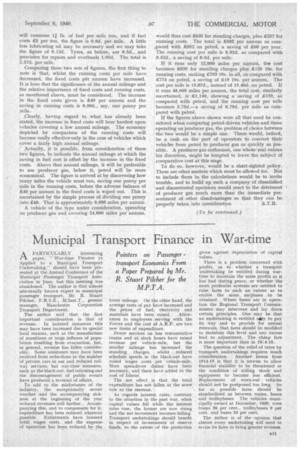Municipal Transport Finance in War-time
Page 29

If you've noticed an error in this article please click here to report it so we can fix it.
Pointers on Passenger transport Economies From a Paper Prepared by Mr. R. Stuart Pilcher for the M.P.T.A.
APARTICULARLY interesting paper, " War-time Finance as Applied to a Municipal Transport Undertaking," should have been presented at the Annual Conference of the Municipal Passenger Transport Association in June, but this meeting was abandoned. The author is that almost universally known expert in municipal passenger transport, Mr. R. Stuart Pilcher, F.R.S.E., M.Inst.T., general manager, Manchester Corporation Transport Department.
The author said that the first important consideration is that of revenue. In isolated instances this may have been increased due to special local reasons, such as the manufacture of munitions or large influxes of population resulting from evacuation, but, in general, revenue has fallen considerably. Some assistance may have been received from reductions in the number of private cars in use and reduced railway services, but war-time measures, such as the black-out, fuel rationing and the discouragement of public events have produced a reversal of affairs.
To add to the misfortunes of the industry, the exceptionally severe weather and the accompanying sickness at the beginning of the year reduced revenues stilt further.. Accompanying this, and to compensate for it, expenditure has been reduced wherever possible. Enlistments have lowered total wages costs, and the expense
of operation has been reduced by the . . lower mileage. On the other hand, the average rates of pay have increased and the prices of fuel, electricity and
materials have been raised. Allowances to employees serving with the Forces and the cost of A.R.P. are two new items of expenditure.
Fewer services on less remunerative routes and at slack hours have raised revenue per vehicle-mile, but the smaller mileage has increased the standing -charges, whilst reduced schedule speeds in the black-out have raised wages costs per vehicle-mile. More spreadover duties have been necessary, and these have added tO the cost of labour, The net effect is that the total expenditure has not fallen at the same rate as the revenue.
As • regards interest rates, contrary to the situation in the past war, when capital values fell while the interest rates rose, the former are now rising and the net investment incomes falling. Transport undertakings should benefit in respect of investments of reserve funds, to the extent of the protection
given against depreciation of capital values.
There is a problem concerned with profits, as to whether a transport undertaking be entitled during wartime to maintain the same profits as it has had during peace, or whether the more profitable systems are entitled to raise fares to such an extent as to enable the same surpluses to be obtained. Where buses are in operation the Regional Transport Commissioners may intervene and lay down certain principles. One may be that an undertaking is entitled os1y to pay its way and to provide for annual renewals, that fares should be modified to maintain this level and any excess lead to adjustment. The cheap fare is more important than in 194-18..
The question of the relief of rates by transport undertakings requires much consideration. Another lesson from 1914-18. is that it is unwise to allow financial stability to be threatened or the condition of rolling stock and equipment to become less efficient. Replacement of worn-out vehicles should not be postponed too long. So far as possible fares should be standardized as between trams, buses and trolleybuses. The vehicles municipally owned at December, 1939, were trains 38 per cent., trolleybuses 9 per cent, and buses 55 per cent.
The author is of the opinion that almost every undertaking will need to revise its fares to bring greater revenue.




















































